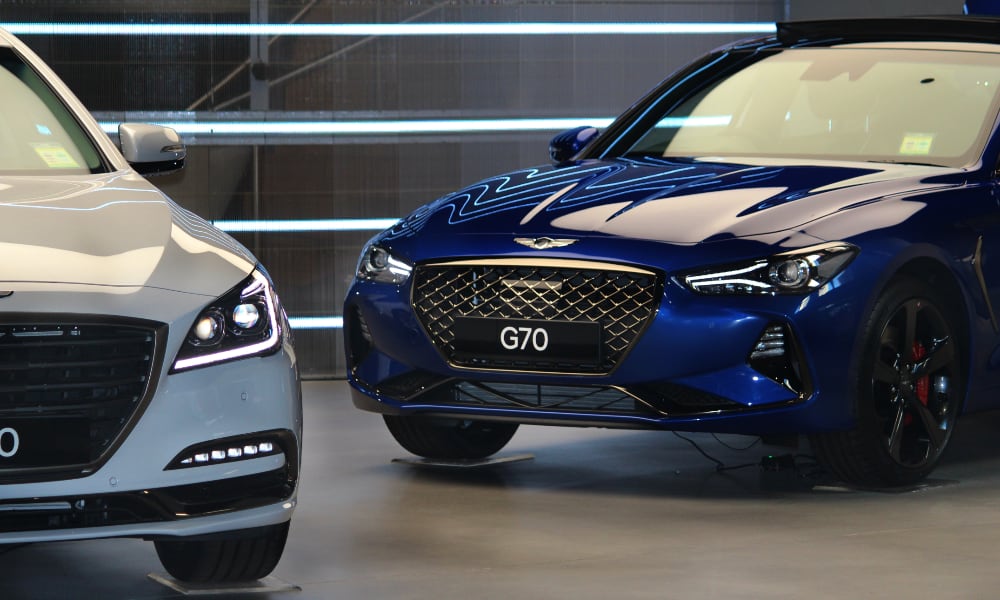Apple’s Digital Car Keys Will Soon Expand Beyond BMW | Is Genesis Next?
 Credit: Rose Makin / Shutterstock
Credit: Rose Makin / Shutterstock
Toggle Dark Mode
It’s pretty much become the norm that whenever Apple introduces a new automotive feature for the iPhone, BMW is the first in line to adopt it. We first saw it with CarPlay in 2014, then Wireless CarPlay in 2017, and then most recently with Car Key in 2019’s iOS 13.6 release.
Even though Apple and BMW seem to have a pretty cozy relationship for these things, these features have never been exclusive to BMW. There’s actually no evidence that Apple gives BMW a leg up on implementing any of this stuff — it’s possible that the carmakers’ tech division is just really keen on embracing all these newest features.
For instance, CarPlay didn’t take long to expand beyond BMW, and today it’s available pretty much everywhere. Wireless CarPlay took a bit longer, since it requires cars to have built-in Wi-Fi, but by last year it was available on at least one model from just about every major car manufacturer.
So, it’s fair to say that we’ve been expecting the same thing to happen with Car Key, especially since it’s not even a proprietary feature on Apple’s part. Car Key is actually an open standard created by the Car Connectivity Consortium, so it’s fair to say the ball for this one is solidly in the court of the automakers.
In reality, this is one area in which Apple is simply too far ahead of the game, but of course somebody has to be first, and although Apple has a long history of leading from behind — bringing existing technologies into the mainstream — it’s nice to see them in the front on this one.
Which New Cars Are Getting Apple Car Key?
So, although BMW may have been the first to the party, more carmakers are expected to adopt the standard in the coming months, and the first of these may turn out to be one of the companies that Apple courted for its own automotive ambitions last year.
According to Bloomberg’s Mark Gurman, the next cars to support the feature will be from Hyundai and its Genesis line, and it’s expected to roll out by this summer.
Gurman notes the irony here, describing the partnership as “a bit of a twist considering Apple and Hyundai’s public tussle over the Apple car’s production about a year ago.” However, we also heard rumours at the time that Hyundai was getting ready to support Apple’s Car Key tech, although it wasn’t clear then — and still isn’t now — whether that had anything to do with the other ongoing discussions between the companies.
It’s also unclear whether Hyundai will be going all the way to supporting the enhanced Ultra Wideband Car Key capabilities, rather than the contact-based NFC version. This improved version, which BMW has dubbed Digital Key Plus, lets you unlock your car without taking your iPhone out of your pocket, much like how normal wireless key fobs work today.
Google is also bringing Digital Car Keys to Android devices — it’s an open standard, after all — but it just began rolling out that support last month, and only for a small subset of Android handsets. It also plans to bring Ultra Wideband Car Key support to Android later this year, which means it’s catching up, as Apple only introduced this version in iOS 15.
Of course, since the new standard was only officially approved last summer, it’s understandable why it’s not available on too many cars. Even BMW has only announced Digital Key Plus for a single vehicle in its lineup, the high-tech 2022 BMW iX.
So, we’ll have to wait and see whether Hyundai will go straight to the 3.0 spec, but we hope so, as the more basic NFC version of Car Key isn’t nearly as useful. As it stands now, current BMW models require you to tap your iPhone on your car door to unlock your vehicle, and then set your iPhone in a specific spot on the console in order to start the engine. That’s a lot more cumbersome than just using your wireless key fob, which works from your pocket.
[The information provided in this article has NOT been confirmed by Apple and may be speculation. Provided details may not be factual. Take all rumors, tech or otherwise, with a grain of salt.]






